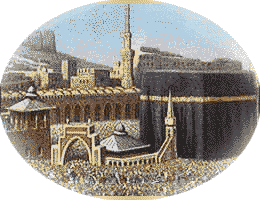| RAMZAN |
|
| Falls on :
1st of Shawwal, Tenth Lunar
month of the Islamic calendar. |
|
| Also known as
:
Id - ul - Fitr |
|
| Religion :
Islam |
|
|
|
| Ramzan or Id-ul-Fitr is celebrated on the 1st
of 'Shawaal', tenth lunar month of the Islamic calendar immediately after the
month of Ramadan. 'Ramadan' is the name of one of the twelve months of the
Muslim calendar year. It coincides with the months of October-November. Ramzan
is a holy month for Muslims. |
|
| Ramzan means the 'festival of breaking the
fast'. Fitr is derived from the word 'fatar' meaning 'breaking'. Another
connotation suggests that it is derived from 'fitrah' or 'alms'. Certain Sunni
Muslims believe that Fitr comes from 'Fitrat' meaning 'nature' and Id-ul-Fitr
is the celebration of god's magnanimity in providing nature to man. |
 |
|
|
Fasting
They fast during the day throughout that month, even without drinking water.
Pious men among them spend the day during the month in prayer and reading their
holy book 'Quran'. They have their meal only at night. Some Muslims spend the
twenty-first and twenty-second days of this month mourning in memory of Ali,
the Prophet's son-in-law, who died in the cause of their religion. |
|
Speciality
The Muslims prepare a special dish for the Idd with
milk and dates, which is called "Shir Khurma". |
|
Legend
Muslims say their holy book came down from heaven to
the earth one night during the last ten days of this month. When it came, the
whole of creation praised Allah or God. It is also believed that Prophet
Muhammad announced a day for celebrations to reaffirm the feeling of
brotherhood. |
|
| On this day, according to the Quran, Allah has
ordained a dole for every Muslim who is free and is in possession of alms
worthy a Pital. This charitable gift, called "Sadaqah Fitr", is a dole to break
the fast. It is to be given to a needy person as thanksgiving. Even One who has
not kept the 'Rozas' (fasting) is expected to give alms. The amount to be
gifted must be in excess of one's essential needs and free from all
encumbrances of debt. Food grains or their costs are permitted to be donated.
The Quran also specifies the grain and their quantities. A person should give
3.5 lb of wheat or its flour per head, or 7lb of barley per head or their cost. |
|
The Festivity
In the morning everyone bathes, wears new or clean
clothes, applies perfume, and eats dates or some other sweet before walking to
the mosque for Id prayers. Men wear white clothes because white symbolises
purity and austerity. |
|
| Special prayers are offered on the Id day and
Muslims in the twin cities of Hyderabad and Secunderabad celebrate 'Ramzan' in
the traditional manner by offering prayers in the mosques, and with the
sacrifice of goats. It is an occasion of feasting and rejoicing. The faithful
gather in mosques to pray, friends and relatives meet to exchange greetings.
Prayers, family get-togethers and feasts are the major highlights of the
celebrations. The family elders, conveying their blessings give 'Idi' or
presents of money to the youngsters. |
|
| They believe that those who do not give alms
on this day will not go to heaven after death. After offering alms, they go to
the house of the 'Qazi' or the Chief Priest to request him to conduct the
prayers. Then they all go together in procession to the chosen spot, and offer
their prayers. After the congregational prayer, the Qazi speaks on religion,
and finally prays to God to forgive them their sins and bless them all with
health, wealth and prosperity. |
|
| At the end of the prayer, they return with the
preacher back to his house. Later they visit their friends and relatives, have
a feast and go shopping in the festive bazaar. Generally, Muslims express their
goodwill for all on this day. They greet everyone with 'Id Mubarak', which
means 'Happy Id'. Like followers of any other religion, Muslims also send Id
greeting cards. |
|
| Even women in 'Purdah' attend the Namaz
prayers in special chambers in the metropolitan cities. Women prepare sweets at
home like 'Sevian', or vermicelli cooked in sweetened milk, which is very
popular. People then go for 'Idmilans' (meeting friends and relatives). Some
people visit cemeteries and stay there for many hours, often even camping out
overnight. This is perhaps to honour their ancestors and to be with their
spirits. To a devout Muslim, Id is a time to forget all past grievances. |
|
|
|
|
|